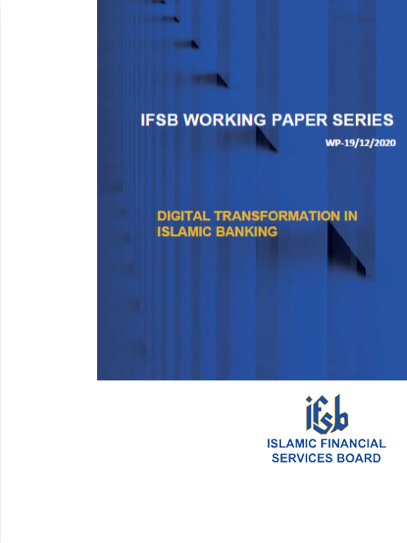About the Platform
The IFSB Digitalisation Platform is a platform established to gather and disseminate information on innovation and digitalisation in the Islamic Financial Services Industry (IFSI) through collaboration and cooperation among a wide network of stakeholders including standard-setters, regulators, supervisors, industry experts and market players. It intends to facilitate the exchange of information, dialogue and coordination among stakeholders, to identify and highlight the critical trends in digitalisation and technological innovation in the IFSI and to develop in-depth insight into these technologies that can be shared with regulators and other stakeholders. It also serves to complement the IFSB’s technical work programme by providing data and inputs for standard development and research work.

DIGITALISATION PLATFORM
- Objectives
- Themes
The main objectives of the Platform are:
- To identify and monitor the critical trends in digitalisation and technological innovation that affect the IFSI and gain more in-depth insight into new developments and disruptors affecting the IFSI.
- To serve as a focal point for cooperation, dialogue and knowledge-sharing amongst key stakeholders including policy makers, supervisors and industry experts on innovation and digitalisation in the IFSI.
- To gather insight that will further guide standard-setting work and regulation of the IFSI in pace with the digital transformation of the industry to ensure stability and resilience of the IFSI
The digitalisation platform centers around the following main themes:
- Digital Islamic Financial Services
- Central Bank Digital Currencies
- Financial Technologies
- Cryptoassets
- Suptech and Regtech
- Sustainability
- DeFi Markets
Publications
Published Papers: Digital Transformation in Islamic Banking (WP v19/12/2020)
Abstract
This exploratory working paper investigates the activities relating to the digital transformation process of Islamic banks (IBs). Data elicited via a survey questionnaire from 80 IBs across 21 Islamic Financial Services Board member jurisdictions were subjected to descriptive analysis to investigate the IBs’ rationales for digitalisation, as well as their current status and the technologies they have adopted. The paper also investigates the regulatory approaches, challenges, prudential risks, and financial stability implications of the digitalisation of Islamic banking. The paper found that in most IBs the digitalisation process is still in progress but has gained more traction since the outbreak of the COVID-19 pandemic. Among many other pertinent reasons cited in the paper, strengthening competitiveness, enhancing operational efficiency, and improving customer satisfaction are the main rationales for IBs’ digitalisation drive. The technologies adopted include mobile and digital wallets, biometric authentication, and artificial programming interface. Notwithstanding, IBs’ digitalisation drive has been impeded by legacy infrastructure, and by the lack of both the requisite human resources and open banking infrastructure and architecture. The paper examines the implications of the benefits and the risks of digitalisation for the stability of the Islamic banking industry and makes recommendations on the way forward.
Extracts from IFSB IFSI Stability Report:
Blockchain Technology and Islamic Finance: Supervisory and Regulatory Concerns
The Bitcoin blockchain is part of a broader FinTech movement that spread rapidly in the years after the Global Financial Crisis (GFC). FinTech evangelists propagated the disruption of financial intermediaries while the incumbent financial institutions started to take a closer look at the underlying technology to understand its disruptive potential. Initially, the focus was on: (a) cryptography for the creation of a trust-less decentralised system for the transfer of digital assets; (b) distributed ledgers for a tamper-resistant networked storage system. Another perspective was added after cryptocurrencies had become an instrument for the financing of FinTech start-ups, and (c) crypto-coins as digital representations of financial and real assets. An understanding of the functioning of these components is a precondition for an assessment of their strengths and weaknesses in the financial industry in general and in Islamic finance in particular. Taking the Bitcoin system as a point of reference, this write-up provides examples that have been selected and that are relevant to Islamic finance.
Digital Islamic Banking: Trends, Implications, and the Way Forward
Islamic banks today face challenges arising from both market structure dynamics and transformation to digital banking. The adoption of innovative technologies and business models is a prominent emerging trend that is fast changing the ecosystem of the IFSI, and Islamic banks are not immune to these developments. This write-up provides insight into the trends, implications, and way forward for the digital transformation in Islamic banking.
IFSB Technical Agenda
Working Papers to be issued in 2024
- Digital Islamic Banking
- Islamic P2P Financing and Crowdfunding
Regulation of Digital Islamic Banking
Technological advancement presents new regulatory and supervisory challenges for financial sector regulators. RSAs have been generally cautious about ensuring that a favourable disposition towards technological financial innovation does not infringe on financial market integrity and stability, and the protection of consumers. As such, RSAs in jurisdictions where Islamic banking is practiced, are adopting different regulatory approaches towards the digitalisation of banking operations to support broader policy objectives like financial inclusion, contestability, competition, and customer value. Depending on the policy objectives, market maturity, and availability of both financial and non-financial enablers, some jurisdictions have bespoke regulations for their digital banking others have adopted and applied extant banking regulations to digital banks.
The objective and scope of the WP
Based on an extensive desktop review of regulations and related documents, and responses to be elicited via a survey questionnaire, the proposed paper is envisaged to present an in-depth discussion and comparison of these various approaches highlighting commonalities and distinctions across jurisdictions where digital Islamic banking is practiced. This will be in specific terms of licensing and capital requirements, supervisory oversight and regulatory regimes, permissible activities, the extent of physical presence and automation of Islamic banking service rendering, ownership structure, fit and proper criteria, and allowance and duration of regulatory and supervisory forbearances and restrictions. Other areas of coverage include but are not limited to concerns about the need for Sharīʻah considerations in digital products and financial apps development in response to the perceived “Sharīʻah neutrality” of technology. market conduct and consumer protection, digital financial literacy plans, pricing, use of third parties, data privacy and protection, cybersecurity, and dispute resolution. A gap analysis will be developed vis-à-vis what other standard-setting bodies have done or plan to do to establish a rationale for any future standards development work of the IFSB in the area.
Regulation of Islamic P2P Financing and Crowdfunding
Due to the increase in internet usage, awareness, and unmet financing needs, Peer to Peer (P2P) and other forms of crowdfunding are arguably the most prominent vertical in Islamic Fintech. Crowdfunding has played a crucial role in providing Shari’ah-compliant funding to small and medium enterprises (SMEs) and emerging start-ups, which hitherto were underserved by the mainstream institutions offering Islamic financial services. As the volume of Islamic crowdfunding platforms and the participation of both retail and institutional investors increase, the question often arises whether a bespoke regulation which is needed to cater to its specificities, and how to ensure a proper balance between regulatory stringency which may stifle innovation, and relaxation which may hinder consumer protection. This question usually centres around issues relating to the diversity of Islamic crowdfunding including donation, equity, reward, projects, and term-based funding. Other issues include the protection of investors especially the private and other stakeholders who may be unsophisticated, systemic risk prevention, money laundering and financing of terrorism, and cross-border limitations and legal uncertainties, etc which have been linked to the lack of regulatory regimes and Shari’ah governance framework in many jurisdictions where Islamic crowdfunding and P2P financing is practiced.
The objective and scope of the WP
Based on an extensive desktop review of extant regulations and related documents, and responses to be elicited via a survey questionnaire, the proposed paper is envisaged to present an in-depth discussion and comparison of these various regulatory regimes highlighting commonalities and distinctions across jurisdictions where Islamic crowdfunding is practiced. This is to facilitate the growth of Islamic crowdfunding while also safeguarding financial consumers. Specifically, the paper will cover the transformation of business models, licensing and capital requirements to ensure operation continuity, custodian requirements, supervisory oversight, and regulatory regimes. Other aspects include permissible activities and appropriateness of instruments offered to investors in the light of both legal and Sharī’ah compliance, the relationship between Islamic crowdfunding platforms and Islamic banks, treatment of platform insolvency, Sharī’ah governance framework, market conduct, consumer protection, information disclosure, and dispute resolution, etc. A gap analysis will be developed vis-à-vis what other standard-setting bodies have done or plan to do to establish a rationale for any future standards development work of the IFSB to address the specificities in Islamic crowdfunding and P2P financing regulation.
